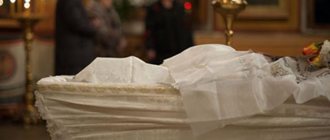With the holding of a farewell ceremony for the deceased, the list of things to do for close relatives does not end. Certain organizational issues will require resolution within about a year after the funeral. To make it easier for you to navigate your priority tasks, we have prepared an algorithm memo with the most important tasks, arranging them according to the degree of urgency.
Basic steps to take after the funeral:
- Disinfect the house or apartment, and also dispose of the deceased’s belongings.
- Install a temporary headstone on the grave or bury the ashes after cremation.
- Organize a funeral.
- Receive funds for burial and/or other required payments.
- Submit a request for payments from the deceased’s funds to compensate for funeral expenses.
- Contact a notary and carry out the procedure for entering into an inheritance.
- Order a permanent headstone, and start landscaping the cemetery plot.
Now let's talk in more detail about each stage and timing.
Funeral arrangements
Procedure on the first day after the funeral
How to clean the house after a funeral?
Having said goodbye to the deceased, the first thing to do is arrange the apartment after his departure. Be sure to disinfect and clean the room. This will not offend the memory of the deceased, and you will be able to quickly free yourself from the heaviness in your soul. After all, a clean house means clean thoughts.
It is not recommended to carry out such procedures on your own. Immediately after death, decay processes begin to occur in the body of the deceased; after just a couple of hours they reach the peak of their activity. To prevent the spread of bacteria and infections, it is necessary to thoroughly disinfect and ventilate the room. This can only be done with special chemical compounds. In addition, many find it mentally very difficult to clean, erasing the last traces of their loved ones’ presence in the house. It is best to entrust this difficult work to specialists, for example, from the city funeral service.
What to do after the funeral with the bed of the deceased?
If a person passes away in bed, it will also need to be disinfected. It is best to discard bedding and accessories and have your bed or sofa professionally cleaned.
Is it possible to keep the clothes of the deceased after the funeral?
It is also difficult to say goodbye to the things of the deceased. Nevertheless, it is necessary to do this. The clothes that a person was wearing at the time of his death should not be stored or given to someone: this can be hazardous to health, such things must be disposed of.
Other personal belongings of the deceased do not pose a threat. However, most often psychologists recommend leaving only the most expensive and memorable items. At the same time, it is not necessary to throw away the clothes of a deceased relative: they can be donated to those in need or to charitable organizations by performing a good deed.
Is it possible to bring home an icon from the coffin after a funeral?
There is no single rule on how to deal with an icon from a funeral: sometimes relatives, after the funeral service, leave it in the church or transfer it to the temple of the patron saint of the deceased. After 40 days, when the soul is at rest, the funeral icon can be taken home and stored in the red corner. On days when loved ones commemorate the deceased, the icon is placed in a prominent place, and a candle or lamp is lit next to it.
Christian customs do not prohibit burying the deceased along with the icon. Therefore, the question remains entirely at your discretion.
9 and 40 days after the funeral: Orthodox Christians hold a wake
According to the teachings of Orthodox Christians, funerals are held on the 3rd day: it is believed that this period is required for the soul of the deceased to complete all matters and find peace.
It is believed that from the 3rd to the 9th day, a heavenly angel lifts the soul of the deceased to the gates of heaven. It is at this time that relatives organize the first wake and order a special service in the temple - this helps the deceased cope with the transition to the afterlife. A wake after the funeral is also organized for 40 days, when the soul’s journey through the halls of hell ends and it awaits the Last Judgment. The prayers of loved ones help the deceased to pass this difficult path. The meeting of relatives on such a day at the cemetery also ends with a wake.
The timing of funerals differs in different religions. For example, Catholics organize them on days 7 and 30, and Muslims on days 7 and 40.
Allow yourself to move on with your life
The living have no alternative. We must live on, building a new life and way of life in which the deceased no longer exists. But how to start enjoying life again! Is it really possible to become happy or fall in love again, because the memories are so fresh, and grief and guilt do not leave you?
We need to start helping ourselves get over what happened. It is important to understand yourself, forgive yourself, decide on your attitude towards the deceased, build your life and become happy.
- Don't feel sorry for yourself.
- Don't dwell on grief.
- Don't forbid yourself to live. There will be no second life, so enjoy it now.
- Don't be ashamed of happiness. Give it to others.
- Don't be afraid to love. Those who left this world definitely want you to live long and be happy.
- Help others by giving them some of your warmth.
- Once you admit your mistakes, apologize to those you have wronged and make amends.
All this, when the grief of loss is mourned, accepted and fully experienced, will help fill life with new colors. After all, the main assistant is time.
If cremation has taken place
Today, the Russian Orthodox Church is much more loyal to cremation than before, but advocates the traditional burial process: the ashes of the deceased must be interred. However, only close people can decide what to do with the remains - in accordance with the last wishes of the deceased or their own views. The ashes may be buried in a cemetery or scattered at a memorial site for the deceased. It is also possible to separate it for subsequent burial in the native places of the deceased and near the place where relatives live.
It is important to remember that after the cremation procedure, the ashes can be stored in the crematorium for no longer than a year. If during this time none of the relatives of the deceased appears, the urn will be buried in a public burial place. After 40 days after cremation, storage of ashes becomes paid.
Example of a memorial speech for the anniversary of the death of a colleague
Dear friends, relatives and relatives of our beloved and respected Klara Vsevolodovna. I would like to introduce myself (say my name). We have worked together with this wonderful, extraordinary woman for the last 15 years. Everyone in our team remembered her as a true professional, specialist, leader and mentor.
She taught us high skills, gave invaluable advice and spiritual guidance, like a mother. Klara Vsevolodovna was patient and responsive to each of us, listening to everyone who turned to her for support. She could lift the spirits of the entire team and always set the mood for the best, even if something didn’t work out.
A year ago we cheerfully celebrated her anniversary, but this golden man is no more. Each of us experiences a great loss. Klara Vsevolodovna embodied cheerfulness, perseverance and determination. We will really miss such a wonderful leader, friend, real mother and just a wonderful person. Rest in peace, dear Klara Vsevolodovna.
Receive compensation for a funeral or burial benefit
For every citizen of our country, a state funeral benefit is allocated. In January 2022, its amount is 6,424.98 rubles, not including additional local payments, the amount of which may vary depending on the region. For example, in Moscow such benefits are paid in the amount of 19,049 rubles 98 kopecks. This figure includes a fixed benefit and the Moscow supplement (12,625 rubles).
There is also a circle of people who are entitled to federal or local benefits, various allowances and compensation, for example, for perpetuating memory. These include:
- veterans of the Second World War and other military operations;
- persons nominated for state awards;
- employees of government ministries and departments (Ministry of Internal Affairs, State Defense, Ministry of Emergency Situations, FSB, State Customs Committee, etc.)
- disabled people.
If relatives want to receive benefits or compensation, you need to remember several important rules:
- the benefit is paid to the person responsible for conducting the funeral;
- compensation can only be claimed if the relatives conducted the funeral at their own expense;
- the period allotted for receiving payments is 6 months from the date of death;
- You can receive payments from territorial pension authorities, as well as from military registration and enlistment offices (depending on the affiliation of the deceased).
Place a monument or tombstone
Immediately after the funeral, it is customary to install a temporary monument at the grave. In Orthodoxy, this is a forged or wooden cross. In Islam - an ordinary column with a sign. A year later, when the earth settles after burial, a tombstone made of granite or marble is installed. Caring for natural or artificial stone has its own characteristics, since improper use of chemically active substances can simply ruin its appearance.
Place a monument on the grave and improve it
When to place a monument on a grave? Act immediately. There is a widespread belief that until the ground settles, there is no point in installing a monument. This is not entirely true. It’s better to start preparing immediately after 40 days: decide what the monument will be like. Choose a ready-made project or order your own version based on an individual sketch.
Begin work on strengthening the grave in the spring. Cover the grave with reinforced concrete beams and lay a concrete base on top of them. After this, you can erect a monument in the summer - it is securely strengthened and insured against ground subsidence and distortion.
You might be interested:
- Money for funeral
- Heirs' rights
- What to do with the things of the deceased
March 22, 2019
Stop payments on the deceased's loans
According to the law, during the time allotted for relatives to enter into an inheritance (6 months), credit organizations cannot charge payments and interest on the deceased’s loan. To stop this process, relatives need to notify the bank about what happened as soon as possible. Typically, in this case, a statement is drawn up and a copy of the death certificate is attached to it. It often turns out that the deceased's loan was insured - then relatives can collect the insurance payments.
Don’t forget to receive your MTPL payment after the funeral
An issued MTPL policy gives relatives the opportunity to receive payment from the insurance company if death occurs as a result of a traffic accident. As with any procedure, there are some nuances:
- The maximum payment amount is 500 thousand rubles. If several people died as a result of an accident, this amount will be divided among their relatives;
- Only one relative of the deceased can receive payment under compulsory motor liability insurance;
- payment is made in a lump sum;
- The payment period is 20 days from the moment the insurer receives an application from relatives.
Receive money from the deceased's account to cover funeral expenses
As a rule, all funds from the accounts of the deceased are transferred to relatives after the inheritance procedure. However, if you need money for funeral arrangements, you can apply for funeral payments without waiting until this deadline. To do this, you need to visit a notary who deals with the issue of the deceased’s inheritance and ask him to issue a decree for the emergency release of funds from an account or savings book. The basis for such a request is Federal Law No. 30-FZ of March 9, 2022.
Typically, banks accommodate relatives and provide them with the requested funds. If this does not happen, you have every reason to turn to the courts to resolve this issue.
Types of help for the bereaved
Most women experience grief on their own, without resorting to outside help. They only need the support of others and communication with people whom they trust and can freely express their emotions. In these situations, it helps to simply know that all of the listed reactions to death are not reprehensible, but quite natural.
If you don’t have a suitable circle of friends, you can tell a priest about your feelings . Spiritual people have extensive experience communicating with the families of the deceased and terminally ill. You can find a support group online and talk to people suffering from similar losses. They willingly share their experiences on how to come to their senses.
6 months after the funeral: start paperwork for entering into inheritance rights
Six months after the death of a close relative, you can begin the process of entering into an inheritance. Of course, each such situation is individual, but we have prepared a general to-do list that will be useful for everyone going through this procedure:
- The first step is to notify the notary that you are ready to accept the inheritance.
- If the deceased owned real estate, the ownership must be registered with Rosreestr.
- For clarity, it is advisable to draw up an inventory of inherited property. It may include both real estate and material goods, as well as funds in various deposits and funds, shares and other securities, the funded part of a pension if the deceased was a pensioner, etc. If a will is not executed, funds will be inherited in accordance with the procedure established by law.
- Often, relatives do not know exactly about all the assets of the deceased: a notary can help in this situation.











